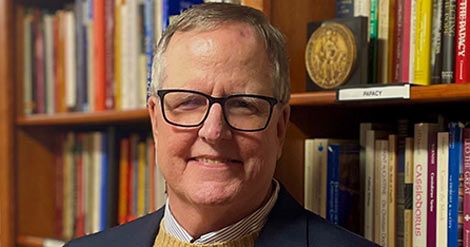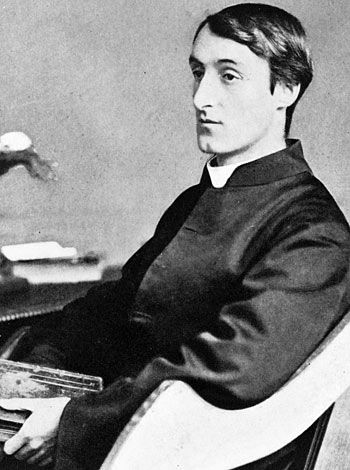Fordham University’s the Rev. Dr. Francis X. McAloon SJ will give a talk with discussion titled “Reading Gerard Manley Hopkins as Spiritual Practice” on Monday, March 21, from 3 p.m. to 4:30 p.m., East Coast (7 p.m.-8:30 p.m., local Irish time).
It will be hosted via Zoom by Spirituality Institute for Research and Education in Ireland, or SpIRE, to mark World Poetry Day.
The SpIRE Spring 2022 Public Lecture is a free event, but registration is required here; for more about SpIRE, visit its website here.
Fr. McAloon writes, “In this lecture, I introduce three sorts of reading strategies. First, ‘reading for information,’ occurs when we follow a recipe in order to bake a cake or update ourselves with the day’s news by reading our favorite websites. On other occasions, we ‘read for aesthetic pleasure,’ either at the beach or by a cozy fire, reading everything from Stephen King to Fyodor Dostoyevsky, to name two extremes.

Dr. Francis X. McAloon's talk takes place on World Poetry Day, March 21.
“A third sort of reading is a spiritual practice, focusing upon personal transformation. Admittedly, traditionally included in this genre of writing are religious texts, sacred scriptures, or the writings of medieval mystics, for example. It is true that, by long tradition, these texts potentially offer opportunities for inspirational or transformative insight; however, I want to expand upon this shelf of texts to include non-biblical poetry, specifically, the poems of Gerard Manley Hopkins, SJ, the mid-19th century English poet who composed some of his best poetry while teaching at University College Dublin. While Hopkins’s poetry often is explicitly or implicitly religious, I prefer to engage his poems in terms of the psycho-spiritual themes of consolation, desolation, and the quotidian. I argue that as a spiritual practice, a transformative engagement with his poetry potentially gives rise to a new sense of self in one’s relationships to the transcendent, others, and the environment.
“What I propose is a possibility, not a certainty, and my choice of Hopkins’s poetry is not exclusionary, but exemplary. There are many other poems and literary forms open to the possibility of the spiritual practice of transformative readings. In this lecture, I modestly propose my favorite poet, Hopkins, who writes from his heart about consolations, desolations, and the everyday of life in 1880s Ireland. Might his poetry have something to say to us 21st century folks? I believe it does!”









